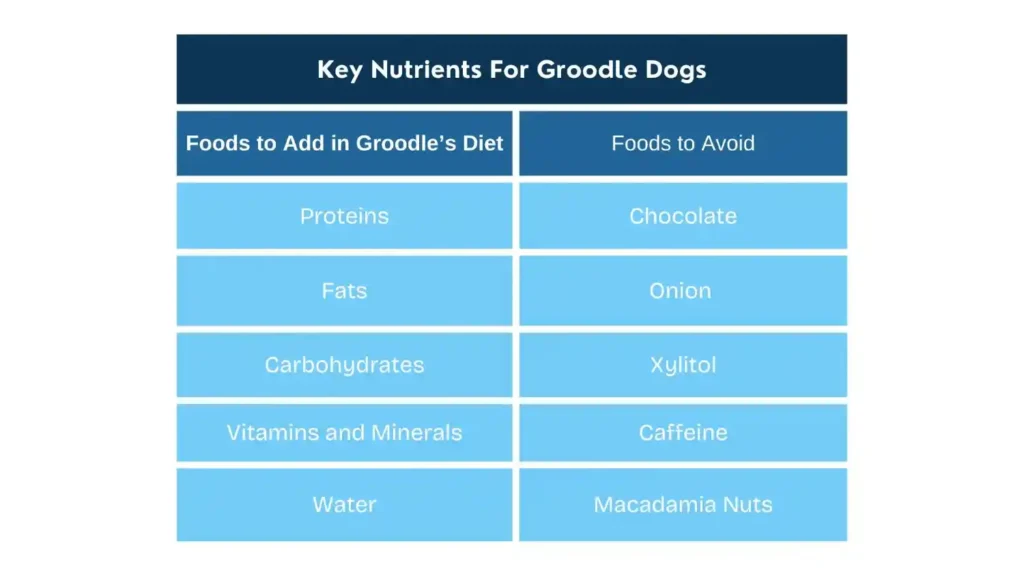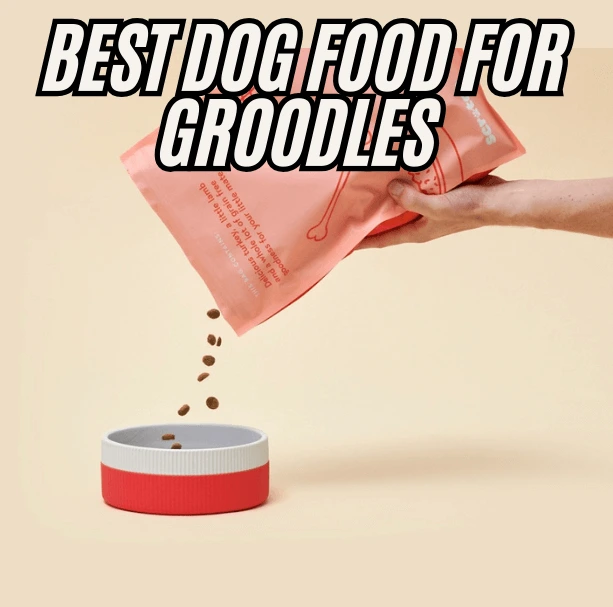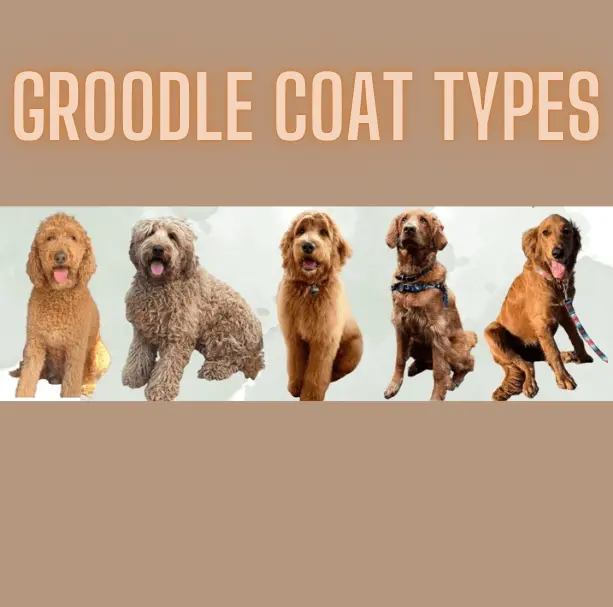Groodle diet is one of the most important aspect to carefully consider, if you are owning a Groodle. The Groodle, a captivating hybrid breed, is the result of breeding a Golden Retriever with a Poodle. It is popular due to its affectionate nature, intelligence, and hypoallergenic coat. As Groodles are becoming the most popular and beloved pets, ensuring their fitness and health, a balanced and nutritious diet is the key to fulfilling their specific fitness needs. Today, we will explore Groodles’s diet, including nutritional requirements, guidelines, dietary considerations, and common dietary issues.
Understanding the Nutritional Needs of a Groodle
A delicious and nutritious diet is essential for caring for your Groodle and maintaining its health and well-being. A Groodle’s nutritional needs vary based on their age, weight, exercise, and overall health. So many dog foods are available so it’s difficult to choose a suitable food for the health and longevity of your Groodle.
Groodles are highly energetic dogs with fast-growing, large bones, making them prone to hip and joint issues. An ideal diet for Groodles includes high-quality meat protein, is carefully balanced to support their growth, and avoids ingredients that could cause inflammation.

Protein
Protein is the critical component of their diet for maintaining muscle development, tissue repair, and overall health of your Groodle. Chicken, beef, lamb, and fish; like animal-based proteins are ideal resources. 18% to 25% of daily caloric intake is recommended for your Groodle, depending upon their age and activity level.
Protein plays a significant role in:
- Provides constant energy
- Help in building and repairing muscles
- Regenerates skin, hair, nails, and other tissues
- Maintains immune system
- Hormones, antibodies, and enzymes are formed by proteins
- Stimulate ongoing amino acid production
Fats
Fat is a crucial nutrient for dogs, providing concentrated energy and supporting healthy skin, coat, and brain function. While protein is the primary nutrient, fat ranks second in importance. Generally, dietary fat is referred to as triglycerides which are often of two types saturated and unsaturated. Both types of fatty acids are compulsory to be included in the diet of dogs. Although Omega-3 and Omega-6 fatty acids are particularly beneficial and are found in fish oil, flaxseed, and chicken. The average amount of fats in Groodles diet is about 8% to 15%, but getting balance is the key. In balanced amounts, they promote a healthy coat, skin, eyes, and nervous system, control hormones, fuel the brain and learning, and reduce inflammation.
Carbohydrates
Carbohydrates are not required in very large quantities but still, they are essential for the digestive health of your Groodle. Sweet potatoes, brown rice, and whole grains are significant sources of carbohydrates for your Groodle. Some vegetables and some fruits contain prebiotics and antioxidants that are lacking in meat solely.
Vitamins and Minerals
Meat, bones, offal, and a small amount of plant ingredients add some beneficial minerals and vitamins into the diet of your Goldendoodle that will help in various bodily functions, A well-balanced commercial dog food contains all the necessary vitamins and minerals. Some essential vitamins are A, D, E, and K, while important minerals are calcium, phosphorus, and zinc.
Vitamins and minerals play an important role in:
- Immune System Support
- Bones Health
- Metabolic processes
Water
Proper hydration is essential for all dogs as 70% of the body is made up of water thus, make sure the availability of fresh and clean water at all times. Water plays an important role in:
- Maintaining the body temperature at an optimal state
- Maintaining the functionality of organs.
- Helps in digestion and absorption of nutrients.
- Helps in detoxification of waste products and toxins
- Prevents dehydration and thus protects the body from various issues including kidney damage and heat stroke.
- Supports the ease of movement of joints by providing lubrication.
Foods to Avoid in Groodle Diet

Some foods are highly poisonous to your pet and their very small amounts can make your pet sick and even can be fatal. If such foods are present in your house keep them away from the reach of your dog and also advise the children to ask before feeding anything to your Groodle.
Chocolate:
Theobromine is a chemical that acts as a cardiac stimulant is found in chocolates and affects the lungs, kidneys, and central nervous system. Generally, dogs love chocolates and it is one of the most important causes of caning poisoning. Dark chocolate due to the higher levels of cocoa is more toxic than milk chocolate.
Onions:
Onions contain thiosulphate which is highly poisonous to dogs and can cause hemolytic anemia. Hemolytic anemia is the destruction of red blood cells and can be characterized by weakness, vomiting, blood in urine, and breathlessness. Onions are harmful in all forms but especially in raw.
Xylitol:
Xylitol is an artificial sweetener found in sugar-free bubble gums and baked goods. Ingestion of xylitol causes stimulation of the pancreas to secrete insulin which as a result causes hypoglycemia. Hypoglycemia is a condition in which there is a sudden drop in blood sugar levels. Xylitol poisoning can be characterized by disorientation and seizures, which can occur within 30 minutes of consumption.
Caffeine:
In addition to coffee, tea, and soft drinks, caffeine can also be found in certain medications. Caffeine is more harmful to dogs as compared to humans, it’s regular consumption can damage the heart, lungs, kidneys, and central nervous systems in dogs. Caffeine poisoning can be characterized by hyperactivity, vomiting, staggering gait, muscle tremors, and convulsions.
Macadamia Nuts:
Macadamia nut poisoning is not fatal but it can cause some uncomfortable symptoms including weakness, drunken gait, and joint swelling within 6-24 hours of consumption.
Feeding Guidelines for Groodles
Feeding your Groodle the right amount of food according to their age and weight is very important to maintain their health and to prevent them from obesity-related issues which are common in this breed. Some important factors that will help you to develop a proper diet plan for your Groodle are given below:
- Metabolism of your Groodle
- Food quality
- Amount of exercise your dog is getting
- The age and breed of your Groodle
- Dog’s weight
Puppy Stage (8 weeks to 12 months)
Puppies are more active and energetic thus, their feeding requirements are more frequent than adults. Puppies require feeding at different frequencies generally three to four times a day to ensure their proper development and to meet their exercise requirements.
| Puppy’s age | Feeding Frequency | Daily feeding amount per day (Regular Groodle) | Daily feeding amount per day (Miniature Groodle) |
| 8 – 12 weeks | 3 to 4 times a day | Up to ⅔ cups | Up to ½ cups |
| 4 – 5 months | 3 times a day | 1.5 to 3 cups | ⅔ cups to 1 cup |
| 6 – 12 months | 2 times a day | 3 – 4 cups | 1 to 1.5 cups |
| 12 months + | 2 times a day | 4 – 5 cups | 1.5 to 2.5 cups |
Choose the best quality formulated food that contains the right balance of nutrients to support their growth and development.
Alternative Food Options
- On specific occasions, cooked rice or pasta with vegetables
- For a lustrous coat use raw eggs.
- To maintain digestive balance feed them yogurt
- During teething bones are a good option
- Instead of minced beef use raw chicken necks for 3 months.
Adult Stage (1 to 7 years)
At different stages of life, different Groodles require different amounts of meals mostly depending upon their weight. However, it is recommended to consult with your veterinarian for an ideal amount of meals to feed your pet. In adulthood, Groodle’s nutritional needs are more stable thus they are required to be fed 2 meals a day. The main purpose is to maintain their ideal weight and support their activity level.
| Weight | Feeding amount per day |
| Miniature (15 to 30 pounds) | 1 to 2 cups |
| Medium (30 to 45 pounds) | 2 to 4 cups |
| Standard (45 to 100 pounds) | 3 to 5 cups |
Senior Stage (7 years and older)
Senior Groodles may become less active and energetic and their metabolism may slow down. Thus they require fewer calories and also it is crucial to maintain their diet to prevent obesity. Senior dog food should contain low calories but be rich in fiber to support digestive health. Older Groodles may be prone to arthritis thus joint-supporting nutrients like glucosamine and chondroitin should be included in the diet.
Special Dietary Considerations for Groodles
Some Groodles may suffer from allergies, sensitivities, or specific health conditions thus they require a special dietary consideration. Here are some conditions where adjustments might be necessary.
Food Allergies and Sensitivities
Groodles may develop some food allergies and sensitivities such as chicken, beef, dairy, and grains. Itching, skin rashes, ear infections, and gastrointestinal issues can identify food allergies. If you recognize any food allergy allergen can be identified by the use of an elimination diet under the guidance of a veterinarian. After identification of allergen exclude the offending ingredient and use a hypoallergenic diet. These diets often feature novel proteins like duck or venison and may also be grain-free.
Weight Management
Obesity is one of the most common issues in Groodles thus, maintaining their proper weight is very important to prevent obesity-related issues including diabetes, heart disease, and joint issues.
Avoid extra-feeding your Groodle and accurately measure their food. If your Groodle is overweight, you should feed them with low-calorie dog food with high fiber to feel them full. Depending upon your Groodle’s age and energy level 30 to 60 minutes of daily exercise is essential for weight management.
Joint Health
Groodles with a larger frame may suffer from joint issues such as hip dysplasia and arthritis. To prevent your Goldendoodle from joint issues, add joint supplements to your dog’s diet that contain glucosamine, chondroitin, and MSM. Omega-3 Fatty acids commonly found in fish oil due to its anti-inflammatory properties can support joint health. Weight management also plays an important role in preventing joint issues by reducing strain on their joints.
Homemade vs. Commercial Groodle Diet
Homemade and commercial foods are used Groodles depending upon their specific requirements and lifestyle. Each type has its pros and cons. Now we will discuss both types so you make a better decision while choosing a diet plan for your Goldendoodle.
Commercial Dog Food
Commercial dog food is highly suitable, balanced, and formulated that fulfill the nutritional requirements of your Groodle and it is found in dry kibble, wet food, freeze-dried options, and in many other forms.
Pros:
- Easy to store and serve
- Balanced diet
- Widely available
- Often includes additional vitamins and minerals.
Cons:
- May include low-quality ingredients or fillers
- Less control over the specific ingredients used
Always prioritize high-quality professional brands while choosing commercial dog food and be aware of the products that use preservatives, colors, and flavors.
Homemade Dog Food
If you choose homemade dog food then you will be able to control the quality and quantity of the ingredients and can fulfill dog requirements. Homemade dog food is more suitable for those dogs suffering from allergies or sensitivities.
Pros:
- Control over ingredients
- Ability to customize the diet
- The potential for higher-quality nutrition
Cons:
- Time-taken process
- Risk of unbalanced nutrition if not properly formulated
- Can be expensive
If you decide to choose homemade food for your Groodle it is recommended to discuss it with a veterinarian or canine nutritionist, they will guide you to formulate a balanced diet that contains all essential ingredients required to fulfill your Groodle’s nutritional requirements.
Treats and Snacks: How Much is Too Much?
Treats and snacks are also an important part of a Groodle’s diet. Snacks can be used as a reward during training sessions to strengthen the bond with your dog and as an occasional treat. But always take care to provide them snacks in a moderate amount to prevent overfeeding and weight gain.
1. Healthy Treat Options for Groodles
You should give them treat which is healthy and beneficial for their health. Vegetables, carrots, green beans, and sweet potatoes are a few options that will be tasty as well as contain low calories. In fruits, seedless apples, blueberries, and watermelons are good choices that are healthy and hydrating. If you want to feed your Groodle with some commercial snacks or treats then always choose those that are free from artificial additives and preservatives.
2. Treat Quantity
Treats should contain less than 10% of your dog’s daily caloric intake to prevent overfeeding which will result in an unbalanced diet and obesity. If your Groodle has more treats than usual days then balance their main meal to adjust calorie consumption.
Common Dietary Issues in Groodles
Regardless of your best efforts to protect your Groodle from any issue they can experience some dietary issues. Here are a few of them:
1. Obesity
Obesity is one of the most common problems among the Groodles. Monitoring their weight, portion sizes, and activity levels are some measures to prevent this issue.
2. Digestive Issues
Groodles can experience digestive issues like diarrhea, constipation, or gas as a result of sudden changes in their diet, food allergies, and feeding non-suitable foods.
Prevention:
- While making any change in their diet do so gradually over a week to prevent digestive issues.
- Their diet must include sufficient fiber to support healthy digestion.
- Include probiotics in their diet to promote gut health and reduce digestive issues.
3. Picky Eating
Some Groodles are picky eaters which will be challenging for their owners. To encourage a healthy appetite you should feed your dog at the same time daily to develop a habit in them. To make the meal more enticing you should add some amount of wet food or a natural food topper.
Groodle Diet FAQs
| Q1. What is the best diet for Groodle? Groodles require a high-quality, balanced diet that meets their nutritional needs. Choose a dog food that is specifically formulated for their size and life stage, and avoid foods with excessive fillers or artificial additives. Q2. Can Groodles eat human food? While occasional treats are fine, Groodles should primarily eat high-quality dog food. Refrain from feeding your dog table scraps or unhealthy human foods, as these can contribute to digestive issues or obesity. Q3. How often should I feed my Groodle? The frequency of feeding depends on your Groodle’s age, size, and activity level. Puppies will need more frequent meals, while adult Groodles can usually be fed once or twice a day. Q4. Is milk a good food for Groodles? Milk can be a treat for Groodles, but it’s important to be cautious. Many dogs, including Groodles, are lactose intolerant, so offer only small amounts and monitor for any digestive issues. |

For the Best Dog Food Options for your Groodle, visit our specific article:
Conclusion
In conclusion, diet plays an essential role in the fitness and overall health of your pet. Providing your Groodle with a balanced and nutrition-rich diet is the only way to ensure your pet’s health.
Feeding Your Groodle a balanced and nutrition-rich meal is crucial for their overall health and fitness. To ensure your Groodle is happy, healthy, and full of life it is important to understand their specific diet requirements and provide them with high-quality food. Whether you are choosing a commercial diet plan or homemade food the priority should be to fulfill their nutritional requirements and provide them with all the essential nutrients required for their health and well-being. Remember to consult with your veterinarian regularly to ensure your dog has the right meal according to age. With a perfect, balanced, and nutrition-rich diet, your Groodle will live a long, healthy life as a cherished member of your family.




